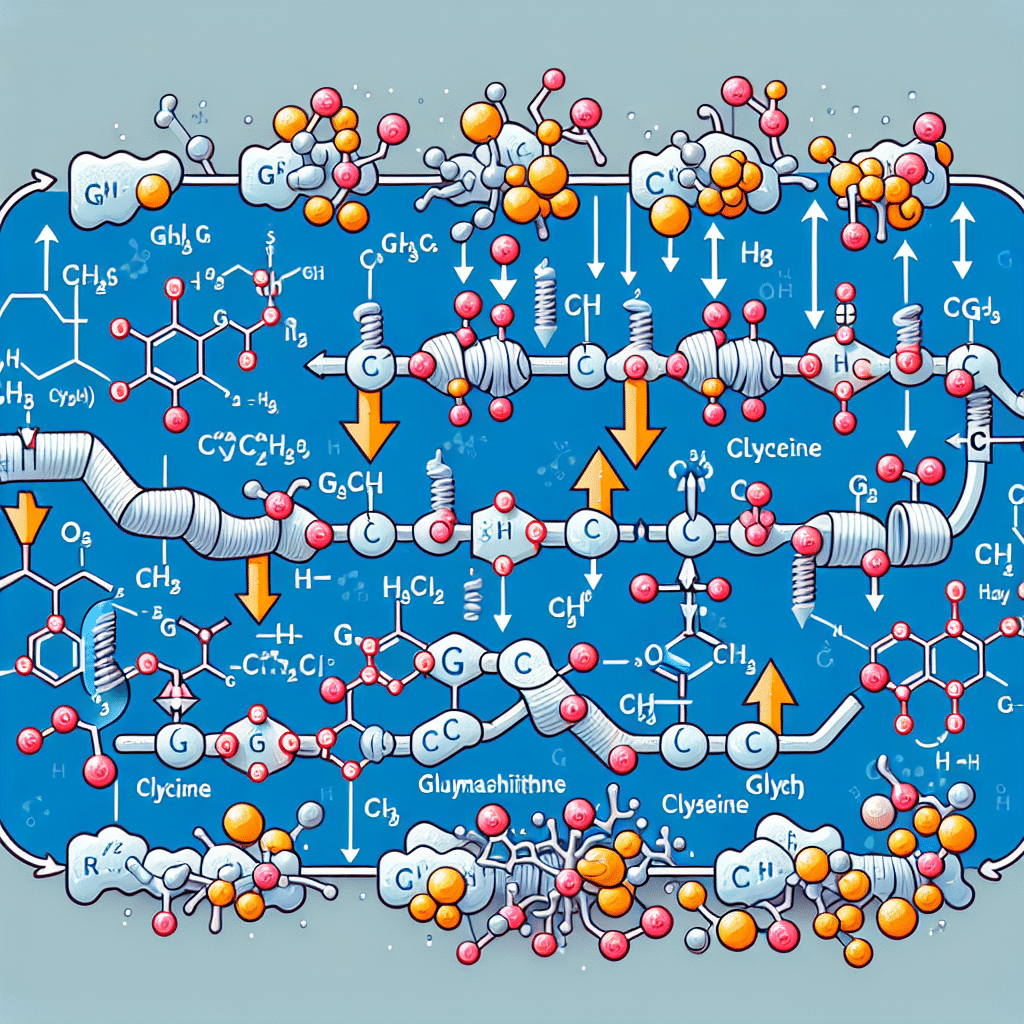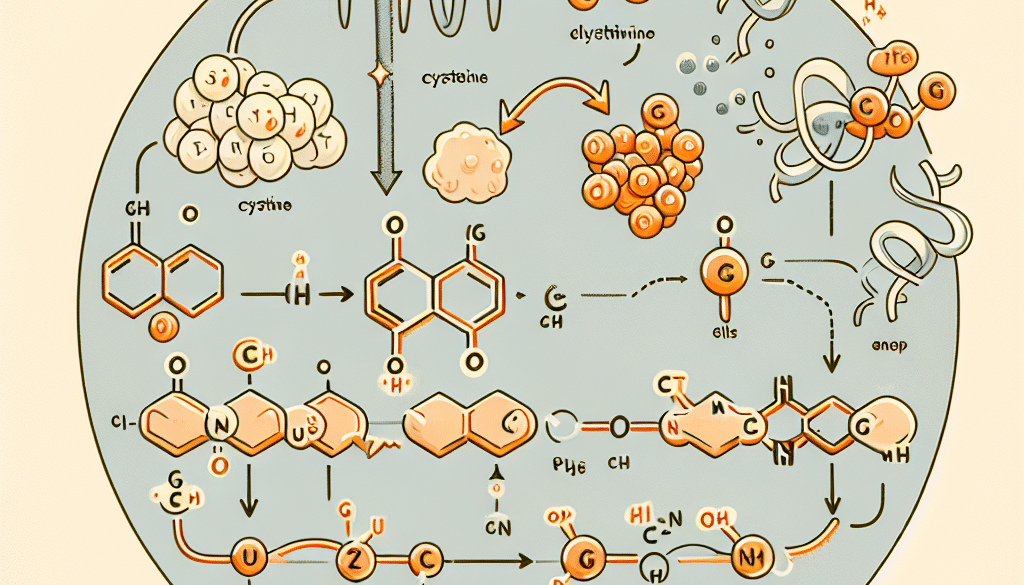Glutathione Synthesis and Cysteine: Importance
-
Table of Contents
- Glutathione Synthesis and Cysteine: The Cornerstone of Antioxidant Defense
- Understanding Glutathione: The Master Antioxidant
- The Synthesis of Glutathione: A Two-Step Process
- Cysteine: The Rate-Limiting Factor in Glutathione Synthesis
- Dietary Sources and Supplementation of Cysteine
- The Health Benefits of Glutathione and Cysteine
- Case Studies and Research on Glutathione and Cysteine
- Challenges and Considerations in Glutathione Supplementation
- Conclusion: Emphasizing the Significance of Cysteine in Glutathione Synthesis
- Enhance Your Health with ETprotein’s High-Quality Protein Products
Glutathione Synthesis and Cysteine: The Cornerstone of Antioxidant Defense

Glutathione, a tripeptide composed of glutamine, cysteine, and glycine, is a powerful antioxidant that plays a critical role in maintaining cellular health and preventing oxidative stress. The synthesis of glutathione and the importance of its precursor, cysteine, cannot be overstated. This article delves into the intricate process of glutathione synthesis, the pivotal role of cysteine, and the implications for human health and disease prevention.
Understanding Glutathione: The Master Antioxidant
Glutathione is often referred to as the “master antioxidant” due to its ubiquitous presence in cells and its multifaceted roles in detoxification, immune function, and the neutralization of free radicals. It is a vital component in the body’s defense system against oxidative damage, which can lead to chronic diseases such as cancer, neurodegenerative disorders, and cardiovascular diseases.
The Synthesis of Glutathione: A Two-Step Process
The biosynthesis of glutathione is a two-step enzymatic process that involves the following stages:
- First Step: The enzyme gamma-glutamylcysteine synthetase catalyzes the formation of gamma-glutamylcysteine from glutamate and cysteine.
- Second Step: Glutathione synthetase adds glycine to gamma-glutamylcysteine, completing the synthesis of glutathione.
This process is tightly regulated within the body to ensure that glutathione levels are maintained within an optimal range.
Cysteine: The Rate-Limiting Factor in Glutathione Synthesis
Cysteine is often the rate-limiting substrate in the synthesis of glutathione. This amino acid’s availability can significantly influence the body’s capacity to produce glutathione. Cysteine itself is derived from dietary sources or through the conversion of methionine, another sulfur-containing amino acid.
Dietary Sources and Supplementation of Cysteine
Obtaining sufficient cysteine is crucial for maintaining adequate glutathione levels. Dietary sources of cysteine include:
- High-protein foods such as poultry, eggs, dairy, red meat, and legumes
- Whole grains like wheat germ and oats
- Plant-based sources such as broccoli, onions, and garlic
For individuals unable to obtain enough cysteine through diet alone, supplementation with N-acetylcysteine (NAC) can be an effective alternative. NAC is a precursor to cysteine and has been shown to boost glutathione levels in the body.
The Health Benefits of Glutathione and Cysteine
The health benefits of maintaining optimal glutathione levels through adequate cysteine intake are vast. These include:
- Protection against oxidative stress and cellular damage
- Enhanced immune function and resistance to infections
- Detoxification of harmful substances and heavy metals
- Potential slowing of the aging process
- Support in the management of chronic diseases such as diabetes, heart disease, and Alzheimer’s
Case Studies and Research on Glutathione and Cysteine
Several studies have highlighted the importance of glutathione and cysteine in health and disease. For instance, research has shown that individuals with HIV/AIDS have lower levels of glutathione, which correlates with disease progression. Supplementation with NAC has been found to increase glutathione levels and improve immune function in these patients.
Another study involving patients with chronic obstructive pulmonary disease (COPD) demonstrated that NAC supplementation led to a reduction in the frequency of exacerbations, likely due to its role in boosting glutathione levels and enhancing lung antioxidant defenses.
Challenges and Considerations in Glutathione Supplementation
While direct glutathione supplementation is available, its effectiveness is debated due to its poor absorption when taken orally. Therefore, increasing cysteine intake through diet or NAC supplementation is often considered a more effective strategy for raising glutathione levels.
Conclusion: Emphasizing the Significance of Cysteine in Glutathione Synthesis
In summary, the synthesis of glutathione and the role of cysteine are fundamental to maintaining cellular health and preventing oxidative damage. Adequate intake of cysteine, whether through diet or supplementation, is essential for supporting the body’s antioxidant defenses and overall well-being.
Enhance Your Health with ETprotein’s High-Quality Protein Products
If you’re looking to support your glutathione levels through dietary means, ETprotein offers a range of high-quality protein products that can help. Their selection of organic and vegan proteins, including rice, pea, and various seed proteins, provides a rich source of cysteine and other amino acids necessary for optimal health.
ETprotein’s commitment to non-GMO, allergen-free products with high purity ensures that you’re getting the best in nutritional support. Whether you’re a distributor, trader, or manufacturer in the food and beverage or health and wellness industries, ETprotein has the solutions to meet your protein needs.
For more information or to sample their products, please contact ETprotein and email sales(at)ETprotein.com today.
About ETprotein:
ETprotein, a reputable protein and L-(+)-Ergothioneine (EGT) Chinese factory manufacturer and supplier, is renowned for producing, stocking, exporting, and delivering the highest quality organic bulk vegan proteins and L-(+)-Ergothioneine. They include Organic rice protein, clear rice protein, pea protein, clear pea protein, watermelon seed protein, pumpkin seed protein, sunflower seed protein, mung bean protein, peanut protein, and L-(+)-Ergothioneine EGT Pharmaceutical grade, L-(+)-Ergothioneine EGT food grade, L-(+)-Ergothioneine EGT cosmetic grade, L-(+)-Ergothioneine EGT reference grade and L-(+)-Ergothioneine EGT standard. Their offerings, characterized by a neutral taste, non-GMO, allergen-free attributes, with L-(+)-Ergothioneine purity over 98%, 99%, cater to a diverse range of industries. They serve nutraceutical, pharmaceutical, cosmeceutical, veterinary, as well as food and beverage finished product distributors, traders, and manufacturers across Europe, USA, Canada, Australia, Thailand, Japan, Korea, Brazil, and Chile, among others.
ETprotein specialization includes exporting and delivering tailor-made protein powder and finished nutritional supplements. Their extensive product range covers sectors like Food and Beverage, Sports Nutrition, Weight Management, Dietary Supplements, Health and Wellness Products, and Infant Formula, ensuring comprehensive solutions to meet all your protein needs.
As a trusted company by leading global food and beverage brands and Fortune 500 companies, ETprotein reinforces China’s reputation in the global arena. For more information or to sample their products, please contact them and email sales(at)ETprotein.com today.












